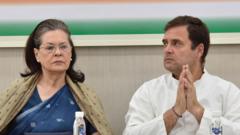Allegations of electoral manipulation in India’s 2024 general elections have sparked intense political discord, with opposition leader Rahul Gandhi claiming systemic irregularities favoring the ruling BJP. Following widespread protests and parliamentary disruptions, the Election Commission and BJP have denied claims of voter fraud, setting the stage for a heated national debate on electoral integrity.
Political Turmoil in India: Allegations of Electoral Manipulation Rock 2024 Elections

Political Turmoil in India: Allegations of Electoral Manipulation Rock 2024 Elections
A fierce dispute arises over alleged "vote theft" in India's recent elections, igniting parliamentary clashes and prompting strong reactions from both opposition parties and the ruling government.
A political crisis has erupted in India as the opposition raises serious allegations of "vote theft" in the recent 2024 general elections. Opposition parties have accused the Election Commission (ECI) of facilitating irregularities that allegedly benefited the ruling Bharatiya Janata Party (BJP). This controversy has intensified following a parliamentary session that was adjourned when opposition MPs demanded a discussion on the integrity of the country's electoral process.
On Monday, dozens of opposition leaders, including Congress party chief Rahul Gandhi, were temporarily detained in New Delhi during a march to the Election Commission's headquarters. Gandhi first voiced these concerns at a press conference on August 7, where he claimed to have uncovered instances of large-scale voter manipulation based on detailed data from the ECI itself. According to Gandhi, the electoral data showed over 100,000 erroneous entries in Mahadevapura, part of the Bangalore Central constituency, pointing to duplicate voters and rampant bulk registrations.
In a dramatic presentation, Gandhi mentioned voters allegedly casting ballots multiple times, and he emphasized the deliberate deletion of CCTV footage from polling stations. He asserted that these irregularities led to Congress losing at least 48 parliamentary seats, accusing the ECI of failing to uphold the principle of "one man, one vote." In contrast, the BJP won 240 out of the 543 seats in the election, garnering strong electoral support.
The Election Commission promptly dismissed Gandhi's allegations, labeling them as "absurd" and demanding either an apology or a formal declaration under oath from him to substantiate his claims. BJP leaders countered the accusations, asserting that the opposition's tactics were undermining democracy and damaging the credibility of constitutional institutions.
Adding to the ongoing saga, Gandhi's claims sparked outrage amid a controversial revision of electoral rolls in Bihar state, set to occur ahead of the November elections. This review, the first since 2003, has drawn criticism as voters report being disenfranchised due to errors such as outdated photographs and deceased individuals remaining on the rolls. India's Supreme Court is currently reviewing multiple petitions against this revision, with demands for transparency on the removed names.
As Gandhi escalated his allegations, asserting systematic voting manipulation on a national scale, the government faces an intensified scrutiny of its election processes. With nearly a billion registered voters in what is deemed the world's largest democracy, the controversy not only raises questions regarding the electoral system's integrity but also highlights the pressing need for reform and accountability within India's political landscape.


















